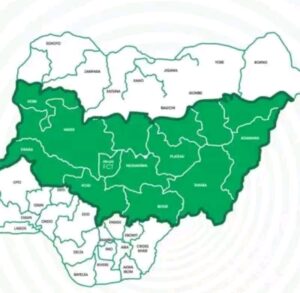We will Defend Ourselves if You Won’t Defend Us, Middle Belt Tells Nigeria
 Tensions escalated in Nigeria’s troubled Middle Belt region on Saturday as 77 civil society groups, community leaders, religious figures, and victims’ organizations convened an emergency Citizens’ Dialogue, raising fresh alarms over the threat of full-scale genocide.
Tensions escalated in Nigeria’s troubled Middle Belt region on Saturday as 77 civil society groups, community leaders, religious figures, and victims’ organizations convened an emergency Citizens’ Dialogue, raising fresh alarms over the threat of full-scale genocide.
The online dialogue, hosted by Middle Belt Concern (MBC) under the theme “Defeating Terror in the Middle Belt,” painted a grim picture of a region besieged by decades of violence, mass displacement, and government neglect.
In a communiqué issued at the close of the meeting, participants warned that the relentless attacks, mass killings, and land seizures across Middle Belt states could culminate in genocide if urgent action is not taken.
“The Nigerian state has betrayed us,” the communiqué charged, pointing to sections of the 1999 Constitution that guarantee the right to life, dignity, and security. Participants condemned successive Nigerian presidents, including President Bola Ahmed Tinubu, for failing to uphold these constitutional duties, accusing them of leaving Middle Belt communities at the mercy of heavily armed terror groups.
They sharply criticized political elites both national and regional — for propagating the misleading narrative that the violence stems solely from farmer-herder clashes linked to climate change. Instead, they argued, the attacks represent a systematic campaign of terror and land conquest.
Further deepening concerns, the dialogue highlighted the failure of Nigeria’s security agencies and intelligence services to act on credible threats despite repeated warnings. Participants alleged official negligence, poor intelligence sharing, and a troubling pattern of inaction that raised fears of complicity at high levels of government and security institutions. Despite overwhelming evidence of crimes, they noted, those who defend or justify acts of terror continue to operate with impunity.
In a decisive move, the participants declared that Middle Belt communities could no longer rely solely on state protection and must assert their constitutional right to self-defense. Describing this right as both God-given and legally enshrined, they resolved to mobilize local defense initiatives to protect their ancestral lands.
The communiqué called for immediate action by local, state, and federal authorities to prevent further massacres. It demanded full transparency in the use of security votes by elected officials and insisted on holding security agencies accountable for failures to protect civilians. Participants urged Middle Belt governors to urgently establish a regional security corps modeled after the Amotekun initiative adopted by South West states. They also pressed for the formal designation of all killer groups operating in the Middle Belt as terrorist organizations, naming the Miyetti Allah Cattle Breeders Association of Nigeria (MACBAN) among those to be scrutinized for alleged support of violence.
Furthermore, the dialogue demanded comprehensive relief efforts, the rebuilding of destroyed communities, and the dignified return of displaced persons. They called for the prosecution of those illegally occupying







